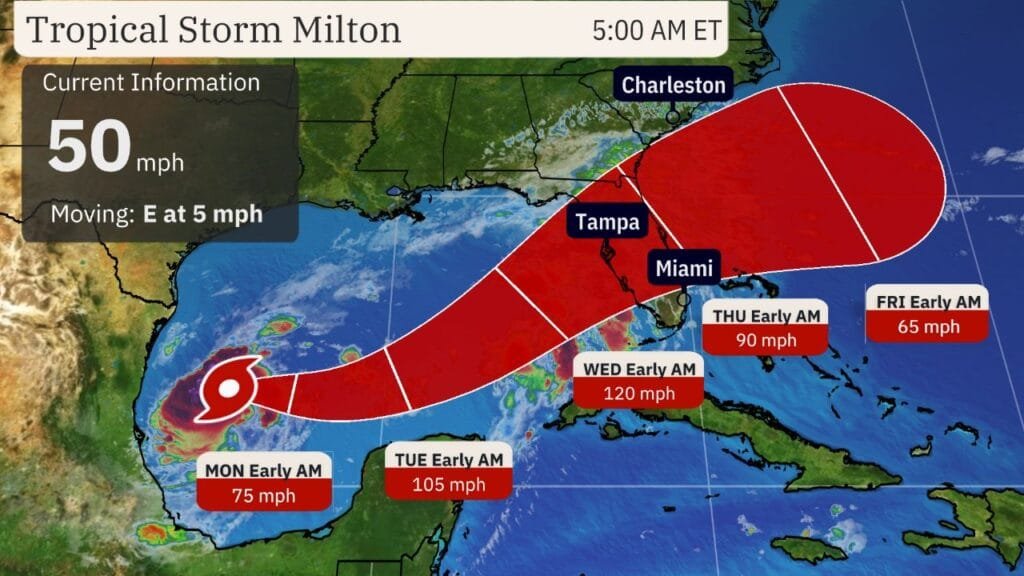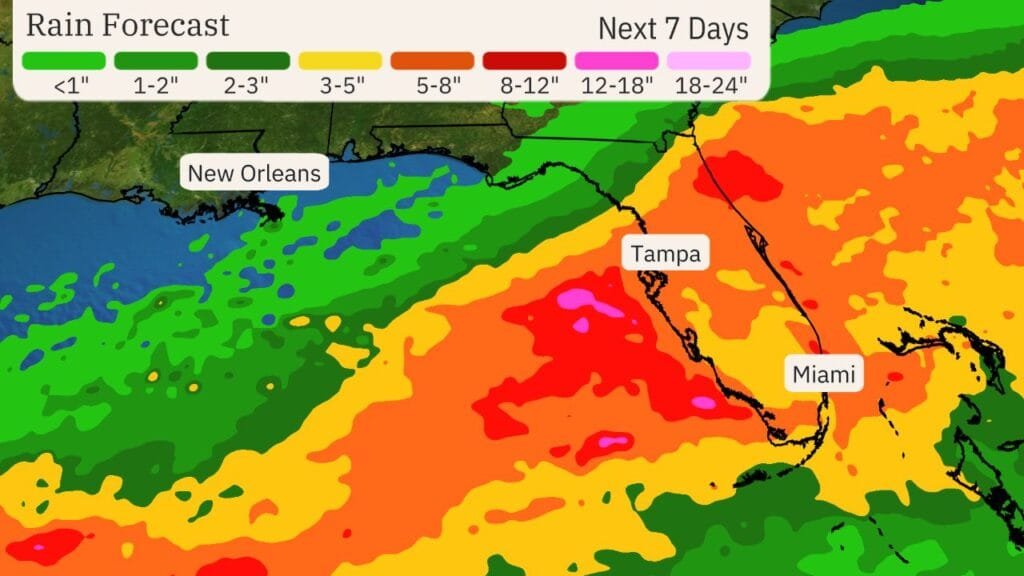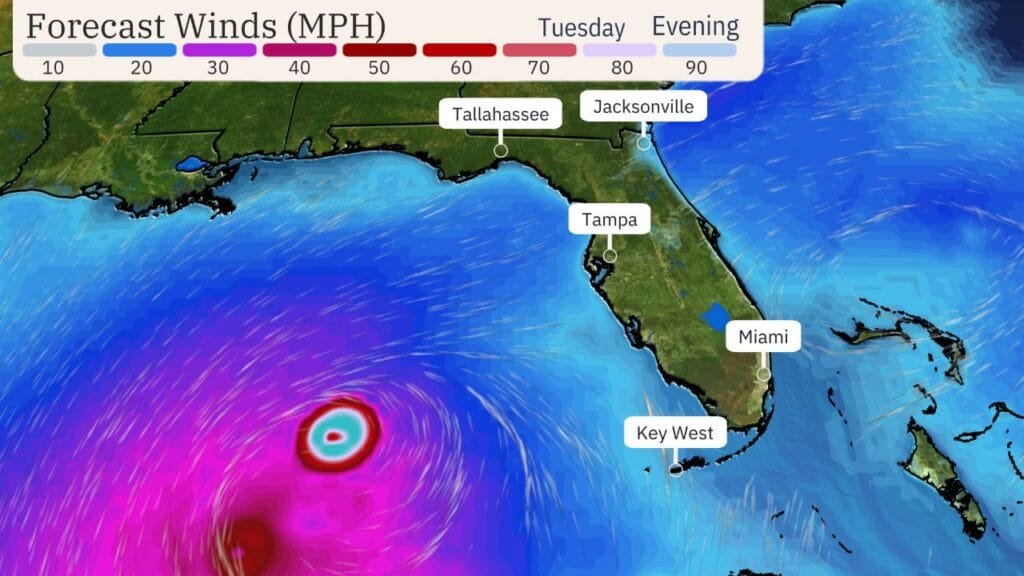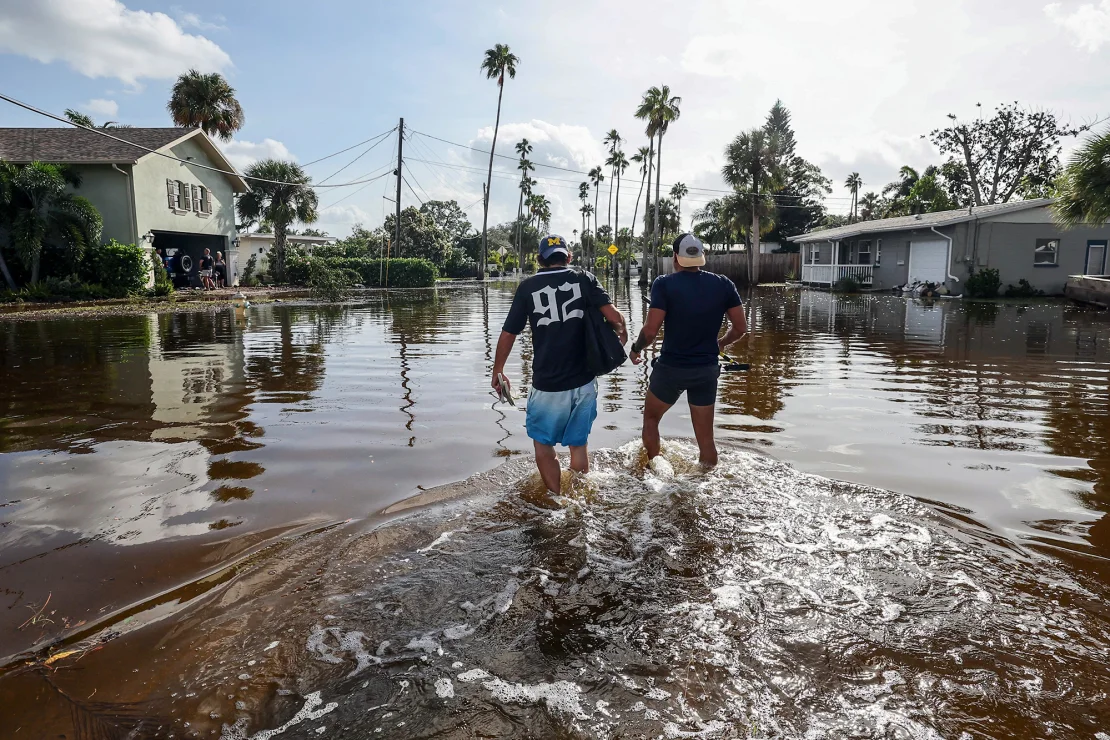Florida is once again in the crosshairs of a potentially devastating tropical system, as Tropical Storm Milton continues to intensify. Meteorologists are closely monitoring its progression, with many forecasting that it could become a full-fledged hurricane before making landfall. As residents of the Gulf Coast brace for impact, Milton’s increasing strength poses a significant threat, bringing heavy rainfall, dangerous winds, and possible flooding.
Hurricane Milton’s Development: From Storm to Hurricane
What began as a relatively mild tropical storm in the Gulf of Mexico has now escalated to become a growing threat to the Gulf Coast. Warm waters and favorable atmospheric conditions have allowed the storm to gain strength quickly, and meteorologists have warned that Milton is likely to develop into a hurricane before reaching Florida.

As of Sunday morning, Milton’s winds had reached sustained speeds of 65 mph, just shy of the 74 mph threshold needed to classify it as a hurricane. With conditions expected to remain favorable for further intensification, the National Hurricane Center (NHC) has placed Florida’s west coast on high alert, advising residents to prepare for the storm’s impact.
Tracking Hurricane Milton: Potential Landfall in Florida
Current tracking models show Hurricane Milton making a direct approach toward Florida’s Gulf Coast. The storm’s trajectory remains uncertain, but experts are predicting that the areas between Tampa and Pensacola are at the highest risk of landfall.
The official Hurricane Milton tracker shows that Milton is expected to make landfall within the next 24-48 hours. The combination of slow movement and high-intensity winds could result in prolonged exposure to dangerous weather conditions for those in its path.
Florida’s Gulf Coast: Preparations Underway
In response to the escalating storm, Florida’s state officials have activated emergency protocols to prepare for Hurricane Milton’s potential landfall. Evacuation orders have already been issued for low-lying areas along the Gulf Coast, where storm surges are expected to reach dangerous levels. Residents are being urged to stock up on essential supplies, including water, food, and medications, as power outages and flooding are highly likely.

Governor Ron DeSantis has declared a state of emergency for the affected areas, mobilizing the National Guard to assist in evacuation efforts and storm preparedness. Local authorities have opened shelters and are preparing for the possibility of widespread damage.
DeSantis emphasized the importance of residents taking the storm seriously, stating, “Hurricane Milton is rapidly gaining strength, and everyone in the potential impact zones must make necessary preparations. We cannot afford to be complacent.”
Potential Risks: Heavy Rain, Flooding, and Storm Surges
The most immediate concern surrounding Hurricane Milton is the expected heavy rainfall. Meteorologists predict that some areas could receive between 8-12 inches of rain, potentially causing significant flooding. Low-lying areas are especially at risk, with officials warning that storm surges could reach up to 5 feet, making coastal flooding a major threat.
Beyond the rain and storm surges, the high winds associated with Hurricane Milton are likely to cause additional hazards. Winds of up to 75 mph could lead to downed power lines, uprooted trees, and structural damage. Widespread power outages are anticipated, leaving residents without electricity for days.
Hurricane tracker data shows that, as Milton moves inland, the storm will continue to bring heavy rains and wind gusts to central and northern parts of Florida.
Impact on Florida’s Infrastructure and Economy
Florida’s Gulf Coast is home to critical infrastructure, including oil refineries, ports, and shipping routes. Any disruption to these facilities could have far-reaching consequences, not just for the state but for the national economy as well. Coastal ports are likely to shut down operations temporarily as a precaution, which could disrupt supply chains.

Florida’s agricultural industry, particularly citrus growers, is also at risk. Prolonged exposure to strong winds and heavy rainfall could damage crops, adding to the economic toll. Additionally, tourism in Florida could take a hit as visitors cancel travel plans due to storm warnings and evacuation orders.
National and International Concerns
The potential damage from Hurricane Milton has garnered attention not just locally, but internationally. FEMA (Federal Emergency Management Agency) is coordinating with local authorities to ensure rapid disaster response, while global markets are keeping a close eye on any disruptions to oil production and transport, which could impact fuel prices.
Beyond the immediate impacts, environmentalists have raised concerns about long-term damage to Florida’s delicate ecosystems, particularly in the coastal regions that are prone to erosion and saltwater intrusion during storms.
Advice for Residents: Preparing for Hurricane Milton
With Hurricane Milton looming, it is essential for residents in its projected path to act quickly and responsibly. Here are a few steps to help prepare:
- Stock Up on Essentials: Ensure that you have enough food, water, medications, and emergency supplies to last at least 72 hours.
- Prepare for Power Outages: Charge your electronics, and have flashlights, batteries, and a backup power source available.
- Secure Your Property: Bring outdoor furniture inside, and secure windows and doors with hurricane shutters or plywood.
- Evacuate if Necessary: If you live in a low-lying or flood-prone area, follow local authorities’ evacuation orders.
- Stay Informed: Keep updated by following the latest information from weather stations and official channels. Use a reliable Hurricane Milton tracker for real-time updates on the storm’s path.
Hurricane Milton’s Path to Florida
As Hurricane Milton approaches, Florida’s Gulf Coast is bracing for impact. The potential for heavy rainfall, storm surges, and dangerous winds make this storm a serious threat to life and property. With preparations underway and evacuation orders issued, the focus remains on minimizing damage and ensuring the safety of residents.
For Latest News Updates Click Here.
